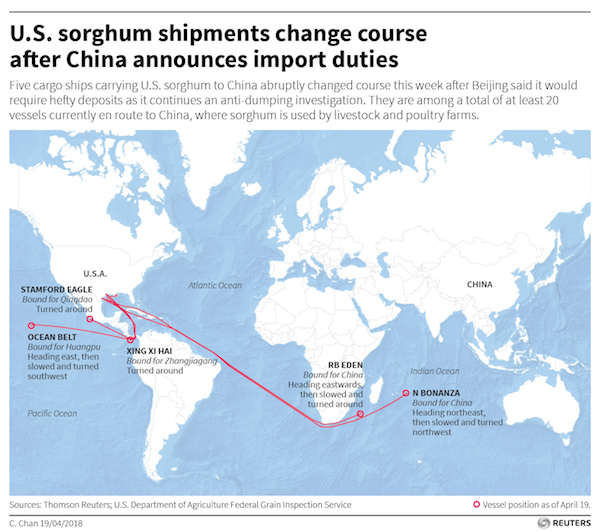
Johannes Vermeer The Concert 1663
Stolen from Gardner Museum March 18 1990, the single largest art theft in the world. Never recovered

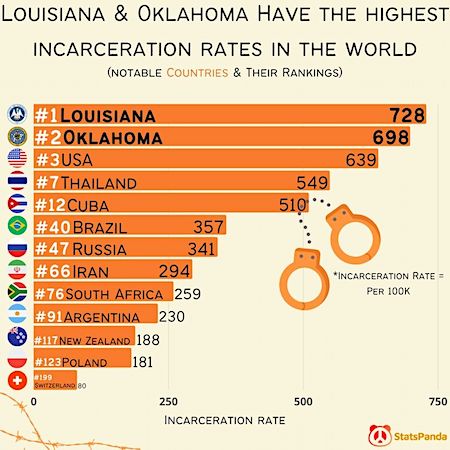

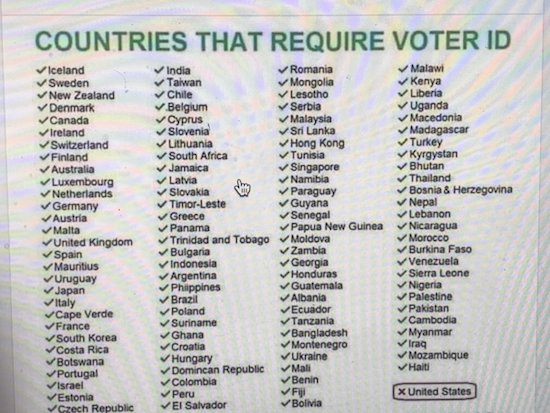

Central bankers discussing Covid is always a bit weird, but this from Daniel J. Wilson at the Federal Reserve Bank of San Francisco is quite interesting. Any fall in cases has been in the models for a long time. It’s unfortunate his models stop at June.
• Where Is the U.S. COVID-19 Pandemic Headed? (FRBSF)
This Economic Letter describes an econometric model useful for forecasting COVID-19 infections at the county and national levels, detailed in Wilson (2021). I base my model on a standard SIR—susceptible-infectious-removed—epidemiological framework, using near real-time data on local mobility behavior, weather, and COVID-19 cases to date. This data-driven, econometric forecasting approach can be thought of as a hybrid between the two general approaches used in other COVID-19 forecasts: structural epidemiological models and nonstructural machine-learning approaches. I combine the basic structural SIR model with parameter estimation based on high-frequency, geographically granular data on transmission factors and COVID-19 cases. This econometric forecast, along with an array of forecasts using the other two approaches, is included in the Centers for Disease Control and Prevention COVID-19 forecasting site.
The model forecasts a steady decline in infections through early June. Analyzing the contributing factors in the model indicates that population immunity acquired from prior infections is the primary driver of recent declines in infections and should continue to exert strong downward pressure on infections going forward. I base my forecasting model on a standard SIR epidemiological model of infectious disease spread (see, for example, Brauer, Castillo-Chavez, and Feng 2019). The SIR model posits that the growth rate of active infections for any infectious disease is determined by the current share of the population that is susceptible multiplied by the current transmission rate, which reflects how much the virus is passing from person to person.
Figure 1 shows the latest national forecast, based on data through March 27, 2021, along with the historical data to date. Active infections are predicted to fall steadily through early June. In particular, the forecast predicts a 71% decline for the 30-day-ahead horizon, equivalent to a drop from approximately 18 daily infections per 100,000 persons recorded as of March 27, 2021 to around 5 per 100,000.
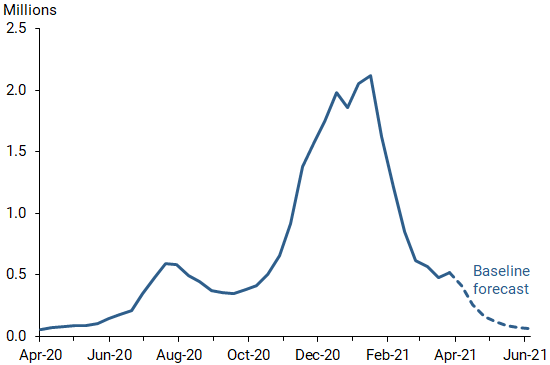
One useful way to evaluate the reliability of these forecasts is to examine how well the model performs when using past data to predict actual infections, shown in Figure 2. The solid and dashed dark blue lines represent the same actual and forecast infections as shown in Figure 1. The other lines show previous forecasts based on data and the estimated model as of the start of each forecast period, indicated by the first dot for each series.
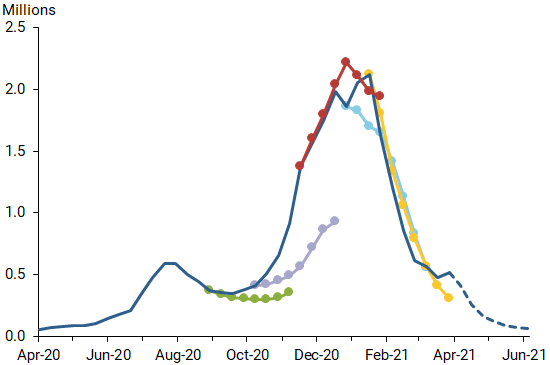
The forecasts have tended to be fairly accurate and have improved over time. Notably, the forecast based on data as of November 17, 2020 (red line), when infections were increasing rapidly, predicted a continued rapid climb for the next 40 days before hitting a peak and starting to decline. That forecast proved broadly accurate except that the actual peak occurred about 10 days later than the forecast predicted. The latest national forecast predicts a steady decline in active COVID-19 infections through early June. To assess what is driving this decline, I use my statistical model to “zero out” each factor’s contribution to the forecast; comparing the result to the full model forecast yields the impact of each factor, shown in Figure 3.
First, eliminating the temperature effect (gold line) yields a slightly slower predicted decline, suggesting that recent warmer temperatures are expected to lower infection rates going forward. Second, eliminating the mobility effect (green line) yields a slightly faster predicted decline, suggesting that increased mobility in recent weeks is slowing down the decline in infections. Third, eliminating the effect of vaccinations to date (red line) yields a modestly slower predicted decline, indicating that vaccinations are contributing to the forecasted decline. Yet, because the share of the population that has been fully vaccinated to date remains relatively modest, vaccinations are not the primary driver of the predicted decline in infections.
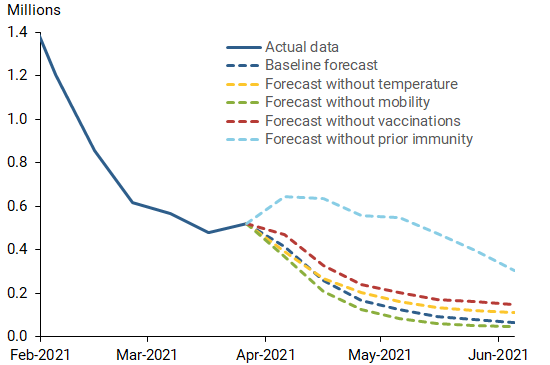

Yes, vaccines work up to a point, their risk is that we don’t know the risk. And the downward trend is the same as that in the models in the first article.
What’s best about this article is the suggestion that Britain is doing well now BECAUSE they messed up so terribly before:
“..the severity of the spread in UK has left higher recovery immunity even in unvaccinated age groups (almost half of under-25s have antibodies)..”
• Britain Sees World’s Sharpest Fall In Covid Cases (Nelson)
At The Spectator’s data hub, updated daily, we keep track of the situation here and around the world. There have been several milestones recently: antibody levels hitting 55 per cent amongst the general population and above 85 per cent for pensioner-aged (who account for the vast majority Covid deaths). Vaccination is paying off: the below graph shows a breakdown by age group. The under-65s are in red.
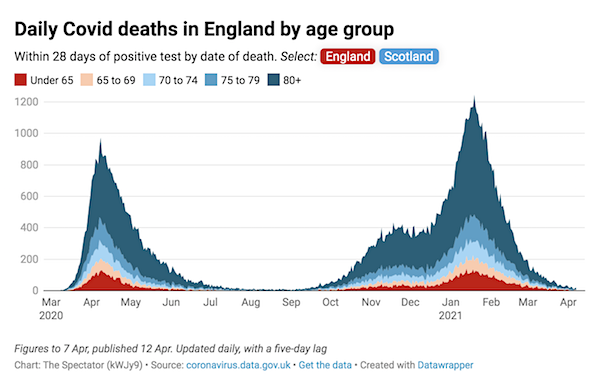
The UK vaccine rollout has been in the world’s top five. And for all its recent troubles, AstraZeneca has shown in real-world tests to be every bit as effective as suggested in trials — as evidenced by antibody growth. This morning we added another table, seeing where Covid infections are relative to their peak. Britain is now 97 per cent below the peak hit before lockdown — the sharpest decline in the developed world. The below is a section of the G20 countries, but with fully-reopened Israel added in. As you can see, it’s right on our tail. Of course, under the Prime Minister’s roadmap, this won’t change the date ending lockdown: 21 June. But this perhaps gives ground for the reopening of hairdressers next week.
I’d personally advocate decriminalisation of all Covid rules at this point, downgrading the guidelines to ‘advice’ and trust people’s judgment a bit more. If every rule was abolished on Monday, I suspect it would take a long time for people to regain the confidence to resume normal life. Britain has had one of the worst Covid death tolls in the world: today’s success in driving down cases should be seen in that context. But the severity of the spread in UK has left higher recovery immunity even in unvaccinated age groups (almost half of under-25s have antibodies, according to the ONS) which limits the size of any third wave. UCL argues that we’ll hit herd immunity this week: we discuss this in the latest edition of The Spectator’s Coffee House Shots podcast. In general, Covid is back down to (or below) summer levels and almost all of those at risk of fatal infection have been protected.
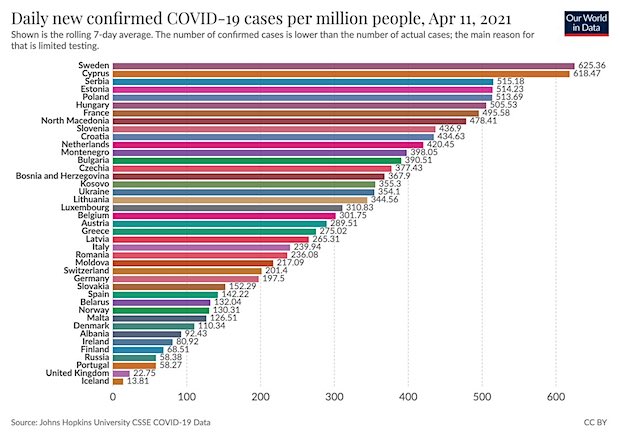

Murray appears to confuse himself a bit, saying it’s immoral not to get vaccinated, but we should never force anyone. But calling someone immoral is also a way of forcing, Craig.
• Domestic Covid-19 Identity Documents Must Be Resisted (Craig Murray)
Discrimination against people on the grounds of their health status is not acceptable, while the ever increasing reach of the surveillance state is pernicious. The idea of people without Covid-19 antibodies being treated as second class citizens should be anathema to anybody with concern for human liberty. It is improbable that Covid-19 will be eliminated from the world in the forseeable future. Like Spanish flu or Hong Kong flu, it will lurk around in the mix of seasonal infections for many years to come, hopefully, but not necessarily, like them becoming less severe through serial mutations. It appears likely that, as with flu, there may be a regular vaccination cycle.
Just now, England and Wales are in negative excess deaths. Less people are dying than normally do at this time of year, on a rolling average of the last five years. I presume Scotland will be similar, though I cannot immediately find current figures. The number of people dying within 28 days of a covid diagnosis is down to approximately 300 a week in the entire UK, and has been steadily falling. How much of this fall is due to vaccination and how much due to lockdown is an open question. But it remains a stubborn and undeniable fact, much as some people do not like it said, that Covid-19 has never been a major threat to young and healthy people. Older people and those in vulnerable groups have in very large majority been at least partially vaccinated now. The odds of those in the unnvaccinated groups dying of covid are really very low indeed.
A medical member of the UK government’s Joint Committee on Vaccination and Innoculation stated on BBC News on Friday that the risk of mortality to a healthy person under 30 who caught coronavirus was 117,000. He was explaining that this is such a remote risk, that it was almost as remote as the chances of a serious side effect from the Astra Zeneca vaccine, and that was why the use of that vaccine in that age group was being suspended; not that the vaccine was dangerous to this age group, but that they didn’t need it enough to justify even a miniscule risk. The point of vaccinating the healthy middle aged and under is not that Covid-19 is a serious risk of death to them; it is not. It is simply to break transmission.
Now I have had my first shot of vaccine myself, and urge everyone to take their vaccine. I have expressed before my view that I believe that refusing to be vaccinated is an immoral position; it is to benefit from herd immunity while refusing to accept the very small personal risk from the vaccine itself. But I utterly reject the notion of compulsory vaccination or of penalising those who do not wish to vaccinated by limiting their lives. Health is a personal matter, and discrimination on the basis of health status cannot be correct, nor the revelation of details of health status to people other than medical professionals employed in care.

Google translate.
• Digital Proof Of Vaccination Will Come In The Second Half Of 2021 (SB.de)
According to the federal government, the digital vaccination certificate should be available by the beginning of the second half of 2021 at the latest. From 2022, the vaccination certificate will be part of the electronic patient record (ePA) in the telematics infrastructure, according to the Federal Government’s response to a request from the FDP parliamentary group. The digital vaccination certificate is an additional option for the yellow vaccination card to document vaccinations against Covid-19. In the future, users should also be able to save the information on their smartphones. The digital vaccination certificate includes a vaccination certificate app, a test app and a back-end system for integration in medical practices and vaccination centers.
The use of the digital vaccination certificate should be free of charge, the certificate should be created by the institutions authorized to vaccinate, such as vaccination centers, medical practices or hospitals. The necessary requirements for integrating a structured vaccination card are only available with the electronic patient record in version 2.0. This will be available as planned on January 1, 2022. Due to the technical dependencies and complexity, an early implementation is not possible. The whole is realized, among other things. from e IBM Deutschland GmbH. According to the current state of planning, costs of EUR 2.7 million are expected.

If even Big Tech protests….
• Apple and Google Block NHS Covid App Update Over Privacy Breaches (G.)
Ministers have paused a planned update to the NHS Covid-19 app after Apple and Google blocked it from their stores over privacy violations. The app, which aids contact tracing in England and Wales, uses technology built by the Silicon Valley companies to track interactions between users with their bluetooth signals and venue “check-ins”. It was to have been updated on 8 April, in time for lockdown easing and the introduction of free rapid coronavirus testing for everyone in England. So far, it has allowed people to check into indoor places such as bars and restaurants by scanning a QR code before they enter, but the data was kept on the individual’s phone. Should a venue be identified as a potential virus hotspot, every device is then sent this data, allowing the app to crosscheck with the owner’s own log of locations and alert them if they might have been exposed.
A new version of the app was planned to automate the process further, instead asking users’ permission to upload their venue history if they test positive. The move, however, broke the rules set by Apple and Google when they built the contact-tracing technology last summer, leading both to prevent the government rolling out the new version of the app. When they released their technology for health services’ use, the companies stipulated that any apps would have to work in a “decentralised” way, avoiding privacy violations that could result from tracking the movements of an entire population and saving them in a centralised database. The plan to allow venue histories to be shared was supposed to be a way around such restrictions because it required active voluntary consent, was only triggered by users who already had a positive test and did not directly use the technology created by Apple and Google, called the Exposure Notification API.

Large scale.
• India Opens Door To Sputnik V For More Than One Billion People (RT)
Reports say that India has given the go-ahead to begin immunizations with the Sputnik V Covid-19 jab, developed by Moscow’s Gamaleya Institute. The world’s second most populous nation becomes the 60th state to approve the formula. On Monday, according to the national paper of record, the Times of India, authorities in the capital, New Delhi, granted Emergency Use Authorization to the Russian-made vaccine. The move comes after an expert committee met earlier this week and agreed to request more information from Hyderabad-based healthcare giant Dr Reddy’s Laboratories, a domestic pharmaceutical company licensed to test and manufacture Sputnik V under agreement with its Russian developers.
The country has seen a record-breaking spike in cases in recent weeks, with 168,912 positive tests recorded in the country on Sunday alone. Since the beginning of the pandemic last march, more than 170,000 people have died with the virus, according to government figures. The South Asian nation was home to 1.36 billion people as of 2019, and forecasts anticipate that it will overtake China as the world’s most populous country within the next five years. India has also been instrumental in the testing of a number of potential vaccine candidates, including British pharma company AstraZeneca’s formula. [..] Another 59 nations have already signed off on the use of Sputnik V, covering a total population of more than 1.5 billion people, many in developing countries. Mexico, Vietnam, Kenya and Hungary are among those already using the jab as part of national immunization programs.

I can not wrap my head around injecting vulnerable (but not to Covid) small people with unknown substances.
“The right to refuse the vaccine begins at age 16..”
• AAP Helps Pediatricians Prepare To Vaccinate Children, Adolescents (AAP)
Pfizer has already requested an EUA for vaccinating children age 12-15, and it “could be available this summer.” For infants, toddlers, and children from 6 months to 11 years, “health officials have estimated vaccination in this age group could start in late 2021 or early 2022.” The right to refuse the vaccine begins at age 16, according to this article from the American Association of Pediatrics. As COVID-19 vaccines inch closer to becoming available for children and adolescents, the AAP is helping pediatricians prepare to administer them…
Pfizer-BioNTech’s COVID-19 vaccine is the only one available for teens as young as 16. However, each manufacturer has been studying its vaccines in adolescents as young as 12, and at least one could be available this summer… Pfizer-BioNTech and Moderna also are conducting trials of their mRNA vaccines in children ages 6 months through 11 years. Health officials have estimated vaccination in this age group could start in late 2021 or early 2022… Adolescents who are at least 16 do not need special consent to receive a COVID-19 vaccine, but pediatricians should inform them about the FDA’s EUA, the potential risks and benefits, their option to accept or refuse and any available alternatives.


We love QR codes, don’t we?
• Rollout Of Eye-Scan Test For Coronavirus Targeted By German Firm (R.)
A Munich-based company hopes to help usher in a new era of coronavirus testing with an eye scan that, it says, takes just three minutes to identify carriers of the disease and has a hit rate of 95%.Semic RF has developed its scanning app with colleagues in the United States and, pending regulatory approval, hopes to start rolling it out there by the end of next month, says its managing director, Wolfgang Gruber. It uses a photo of the eye taken with a smartphone, and identifies the virus by means of a symptomatic inflammation called “pink eye.” “We managed to isolate Covid-19 from over two million different shades of pink,” Gruber told Reuters.
He says the app, already tested on over 70,000 individuals, can process up to a million scans per second and the option to expand that capacity further – potentially allowing crowds back into mass-attendance events like concerts and football matches. “You take your app, take a picture of both eyes, send it for evaluation, and then you can have the evaluated result stored as a QR code on the tested person’s smartphone,” Gruber added. The app is initially being targeted at companies and commercial users, at a cost of 480 euros ($570) per month, with a later rollout to private individuals planned.

“….And They’ve Been Playing Us The Whole Time…”
• Forced Masking Is Behavioral Science, Not Medical (TH)
Most people probably think of epidemiologists as simply doctors who specialize in contagious illness, but that would be only part of the story. Indeed, rather than studying and finding cures for diseases, arguably the most important component of the field is increasingly being viewed as something else entirely – the molding of public behavior. This explains why so many who go into epidemiology hold undergraduate degrees in public health, which focuses on the social and behavioral sciences, instead of the more hard-core sciency stuff studied by their medical doctor peers, like biology or biochemistry. So when epidemiologists like Dr. Anthony Fauci make pronouncements from on-high, one must always be aware of the motive behind their messaging – to get YOU to do what THEY tell you to do, purportedly in an effort to “stop the spread” of whatever contagion they are fighting.
Except, if you do a deep dive into the nature of most of the world’s response to today’s particular disease du jour, COVID-19, you’ll see that little of it ever had to do with actual science or data. Instead, the bulk of it has focused on implementing and forcing the public to comply with certain non-pharmaceutical interventions (NPIs), like lockdowns and masking, settled upon early on in the pandemic. While discussing his epic bestseller “Faucian Bargain: The Most Powerful and Dangerous Bureaucrat in American History” with Fox News host Tucker Carlson, radio host Steve Deace described perhaps the most critical 11 days in recent U.S. history: “On February 28 of last year, Fauci wrote in the New England Journal of Medicine that when he analyzed the data for COVID-19, he thought it would be just about as bad as a pandemic-level flu,” said Deace.
“And then 11 days later, he went to Congress and told everybody that this was gonna be Captain Trips [the name for the ultra-deadly antigen that exterminates 99.4% of the human population in Stephen King’s “The Stand”], and that’s what shut the country down.” Citing the known case and infection fatality rates – at around 1.8 percent and .18 percent respectively – Deace described Fauci’s “original cautious and modest expectations” as having turned out to be true. “So why did he abandon those for the fear porn we’ve seen the past year?” he asked. “We must get answers to questions like that … What changed those 11 days, because it changed the fate of America.”
At one point during those 11 days, on March 8, Fauci also gave his now-infamous interview to “60 Minutes” in which he declared that the general public should not “be walking around with a mask.” The next month, of course, the CDC did a complete 180-degree reversal, and Fauci later attributed his earlier stand, which was based on sound science and is still provably correct a year later, to a ‘noble lie’ of sorts, that he was merely saving PPE for healthcare workers. Riiight. As if there wasn’t enough T-shirt material, bandanas, and neck gaiters to go around, or something. The ‘good’ doctor also hilariously claimed that the possibility of asymptomatic spread wasn’t “clear” in March, even though the news-following public, including myself, was well aware of the claim as early as January 2020.

March 4, 2020. What happened since?
• Health Experts Are Telling Healthy People Not to Wear Face Masks (Time)
As the new coronavirus COVID-19 spreads in the U.S., people who are well want to stay that way. But since no vaccines are currently available, the strongest weapons Americans have are basic preventive measures like hand-washing and sanitizing surfaces, according to the Centers for Disease Control and Prevention (CDC). The simplicity of those recommendations is likely unsettling to people anxious to do more to protect themselves, so it’s no surprise that face masks are in short supply—despite the CDC specifically not recommending them for healthy people trying to protect against COVID-19. “It seems kind of intuitively obvious that if you put something—whether it’s a scarf or a mask—in front of your nose and mouth, that will filter out some of these viruses that are floating around out there,” says Dr. William Schaffner, professor of medicine in the division of infectious diseases at Vanderbilt University.
The only problem: that’s not effective against respiratory illnesses like the flu and COVID-19. If it were, “the CDC would have recommended it years ago,” he says. “It doesn’t, because it makes science-based recommendations.” The science, according to the CDC, says that surgical masks won’t stop the wearer from inhaling small airborne particles, which can cause infection. Nor do these masks form a snug seal around the face. The CDC recommends surgical masks only for people who already show symptoms of coronavirus and must go outside, since wearing a mask can help prevent spreading the virus by protecting others nearby when you cough or sneeze. The agency also recommends these masks for caregivers of people infected with the virus.
The CDC also does not recommend N95 respirators—the tight-fitting masks designed to filter out 95% of particles from the air that you breathe—for use, except for health care workers. Doctors and health experts keep spreading the word. “Seriously people- STOP BUYING MASKS!” tweeted Dr. Jerome Adams, the U.S. Surgeon General, on Feb. 29. “They are NOT effective in preventing general public from catching #Coronavirus, but if healthcare providers can’t get them to care for sick patients, it puts them and our communities at risk!” [..] But people keep buying and wearing masks.
Some believe that wearing a mask reduces how many times they touch their nose and mouth, “but there aren’t any data to support that that’s a useful intervention,” Schaffner says. Other reasons are purely psychological. One stems from the fear of losing control to a virus we know little about preventing. “There’s not much we can do, so we’re all walking around feeling rather victimized by this virus,” says Schaffner. “By using a mask, even if it doesn’t do a lot, it moves the locus of control to you, away from the virus. It gives the individual a greater sense of control in this otherwise not-controlled situation.”

With inbuilt expiry dates?
• Washington Mulls Digital Dollar, Sees Chinese e-Yuan As Potential Threat (RT)
Top US officials are reportedly calling for a hard look at China’s plans for a digital yuan, after raising concerns that the new currency may potentially challenge the greenback as the world’s dominant reserve currency. Officials at the Treasury, State Department, Pentagon, and National Security Council are currently trying to explore the potential implications of China’s new sovereign digital currency, people familiar with the matter told Bloomberg. The presidential administration is reportedly not concerned about the immediate challenge the e-yuan might pose to regulatory frameworks and monetary systems. However, American officials are worried that the new Chinese currency may be used to bypass US sanctions. Moreover, the government officials would like to know how the digital yuan will be distributed.
Last year, the People’s Bank of China revealed plans to have its sovereign digital currency ready in time for the 2022 Winter Olympics. China became the first country in the world to test such a product on a national level. According to the Chinese central bank, the new currency will share some features with cryptocurrencies such as Bitcoin. The digital yuan is projected to replace banknotes and coins. The White House is said not to be planning any measures against the e-yuan, but is highly interested in creating a digital dollar. So far, members of Congress have reportedly asked Federal Reserve Chair Jerome Powell and Treasury Secretary Janet Yellen about the issue in hearings earlier this year.

“..perhaps nobody is in charge?”
• A Hundred Days of Joe (Jim Kunstler)
Is the Democratic Party determined to drive the nation insane? Kind of looks like that. They certainly seem bent on fomenting a race war. That would be insane, but the Democratic Party’s will to punish the nation eclipses all its other hopes, dreams, and aims — and that degree of sadism tends to indicate a mental health problem. Prior to 2020, they had already destroyed at least a dozen US cities via sheer mal-administration, and the George Floyd riots across the country successfully wrecked much of what bad governance plus the Coronavirus lockdowns had left behind.
Wouldn’t you think that things are already bad enough, for instance, in Minneapolis, what with the Derek Chauvin trial about to entertain the defense’s case, and the courthouse secured like Fort Apache? And so, a fresh incident occurred on Sunday involving one Duante Wright, 20, shot during a traffic stop. Apparently, there was a warrant out for Mr. Wright, meaning he was a suspect in a crime. When the police tried to detain him, he got back into his car against their clear instructions, raising the possible inference that he might be going for a gun. The officer shot him. A riot ensued, of course. In the chaos, some looting occurred. Black Lives Matter turned out in a matter of minutes, along with members of Duante Wright’s family. Is another martyr being manufactured?
What message do you suppose the Minneapolis city council sent last month when it settled $27-million on the family of George Floyd — before the trial in the matter even began? It looks more and more like a high stakes hustle: Whatever the truth is about an incident that involves the police, the city will burn and large cash settlements await. Calling personal injury attorney Ben Crump…. And so, the riot season has arrived, as if right on schedule. If Minneapolis and other cities start burning again, will Mr. Biden be positioned to ignore it as he’s ignored the now-lawless situation at the border? Will his managers wind him up to inveigh against “white supremacy?” Or have they set a dynamic feedback loop in motion that is fast running beyond their control — making it clear that perhaps nobody is in charge?

@jonmitchell_jp writes in his new book POISONING THE PACIFIC about the human costs to US sailors of the Fukushima nuclear disaster in 2011.


• Japan To Start Releasing Fukushima Water Into Sea In 2 Years (AP)
Japan’s government decided Tuesday to start releasing treated radioactive water from the wrecked Fukushima nuclear plant into the Pacific Ocean in two years — an option fiercely opposed by fishermen, residents and Japan’s neighbors. The decision, long speculated but delayed for years due to safety concerns and protests, came at a meeting of Cabinet ministers who endorsed the ocean release as the best option. The accumulating water has been stored in tanks at the Fukushima Daiichi plant since 2011, when a massive earthquake and tsunami damaged its reactors and their cooling water became contaminated and began leaking. The plant’s storage capacity will be full late next year. Prime Minister Yoshihide Suga said ocean release was the most realistic option and that disposing the water is unavoidable for the decommissioning of the Fukushima plant, which is expected to take decades.
He also pledged the government would work to ensure the safety of the water and to prevent damaging rumors. The plant’s operator, Tokyo Electric Power Co., and government officials say tritium, which is not harmful in small amounts, cannot be removed from the water, but all other selected radionuclides can be reduced to levels allowed for release. Some scientists say the long-term impact on marine life from low-dose exposure to such large volumes of water is unknown. The government stresses the safety of the water by calling it “treated” not “radioactive” even though radionuclides can only be reduced to disposable levels, not to zero. The amount of radioactive materials that would remain in the water is also still unknown.

“Such action is wrong, unlawful and dramatically undermined the integrity of the 2020 election. We must not let a shadow government run our elections to the benefit of favored candidates and political parties.”
• Zuckerberg Group Gave Detroit $7.4 Million To ‘Dramatically’ Expand Vote (JTN)
The Center for Tech and Civil Life (CTCL), a voter advocacy group funded by Facebook founder Mark Zuckerberg, donated $7.4 million last year to Detroit to, among other things, “dramatically expand strategic voter education and outreach” in a blue city key to Joe Biden’s 2020 election win, according to memos obtained by Just the News under an open records request. Detroit received three grants in 2020 from CTCL for $200,000, $3,512,000, and $3,724,450, according to the records released under Michigan’s Freedom of Information Act (FOIA). The amount augmented by more than half the city’s $13 million election budget, and dwarfed it the $6.3 million in grants that CTCL gave five Wisconsin cities, a series of donations that has generated accusations that private money was wrongly used to influence state and local election judges and administrators.
The reach of Zuckerburg’s money has created a backlash in some GOP states like Georgia and Arizona, where lawmakers have moved since November to ban private money from being donated to election administrators. Phill Kline, head of the nonprofit Amistad Project, which has contested private financing of election administration in several states, said the Detroit memos show another instance in which Zuckerberg money was allowed to influence a key battleground during the 2020 election. “The records obtained in Wisconsin, Pennsylvania and Michigan show the Zuckerberg monies were used to buy off government officials dictating the manner in which the election was conducted and using government to target Democrat strongholds to turn out the vote for Mr. Biden,” Kline said. “Such action is wrong, unlawful and dramatically undermined the integrity of the 2020 election. We must not let a shadow government run our elections to the benefit of favored candidates and political parties.”

Two part article from Whitney. Must read.
• The Military Origins of Facebook (Whitney Webb)
A few months into Facebook’s launch, in June 2004, Facebook cofounders Mark Zuckerberg and Dustin Moskovitz brought Sean Parker onto Facebook’s executive team. Parker, previously known for cofounding Napster, later connected Facebook with its first outside investor, Peter Thiel. As discussed, Thiel, at that time, in coordination with the CIA, was actively trying to resurrect controversial DARPA programs that had been dismantled the previous year. Notably, Sean Parker, who became Facebook’s first president, also had a history with the CIA, which recruited him at the age of sixteen soon after he had been busted by the FBI for hacking corporate and military databases. Thanks to Parker, in September 2004, Thiel formally acquired $500,000 worth of Facebook shares and was added its board.
Parker maintained close ties to Facebook as well as to Thiel, with Parker being hired as a managing partner of Thiel’s Founders Fund in 2006. Thiel and Facebook cofounder Mosokvitz became involved outside of the social network long after Facebook’s rise to prominence, with Thiel’s Founder Fund becoming a significant investor in Moskovitz’s company Asana in 2012. Thiel’s longstanding symbiotic relationship with Facebook cofounders extends to his company Palantir, as the data that Facebook users make public invariably winds up in Palantir’s databases and helps drive the surveillance engine Palantir runs for a handful of US police departments, the military, and the intelligence community.
In the case of the Facebook–Cambridge Analytica data scandal, Palantir was also involved in utilizing Facebook data to benefit the 2016 Donald Trump presidential campaign. Today, as recent arrests such as that of Daniel Baker have indicated, Facebook data is slated to help power the coming “war on domestic terror,” given that information shared on the platform is being used in “precrime” capture of US citizens, domestically. In light of this, it is worth dwelling on the point that Thiel’s exertions to resurrect the main aspects of TIA as his own private company coincided with his becoming the first outside investor in what was essentially the analogue of another DARPA program deeply intertwined with TIA.

Only partly funny.
• Media Relieved To Be Covering The Good Kind Of Riots Again (BBee)
Media organizations across the country announced today they are relieved to be covering the good kind of riots again, now that people are looting Targets for justice again instead of protesting their government. “It was pretty rough there for a while,” said Rachel Maddow. “We had to cover the dark days of the violent insurrection. But now that people are stealing Nikes to protest racial injustice, we can return to feel-good reporting about the good riots that are happening.” “It’s just the Spring of Love around here!” she added happily.
Many journalists are calling this the shot of positivity the nation really needed in the aftermath of the worst days in our country’s history following the riot at the Capitol. Finally, they say, the nation has remembered what protests are for: stealing stuff and burning things down before any facts have come in. “I was pretty depressed having to cover the worst riots our nation has ever seen,” said Brian Stelter as he wiped tears from his eyes on his Sunday program. “We can finally get back to what the people want: puff pieces minimizing the violence and destruction wrought by protests that we agree with.” “But don’t worry — we will continue to watch Fox News and yell at it, just for you.”


We try to run the Automatic Earth on donations. Since ad revenue has collapsed, you are now not just a reader, but an integral part of the process that builds this site. Thank you for your support.



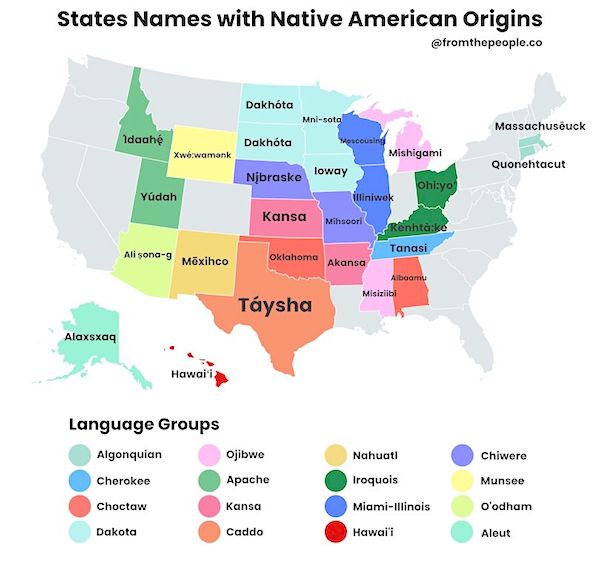

Support the Automatic Earth in virustime. Click at the top of the sidebars to donate with Paypal and Patreon.



